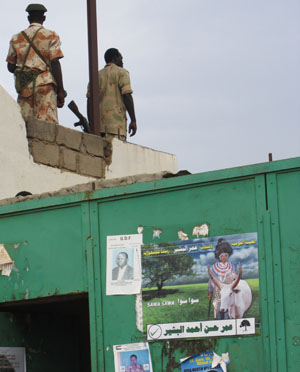
JUBA, Southern Sudan – I don’t think I was the only person in Juba who attended the ruling National Congress Party’s rally to kick off President Omar al-Bashir’s three-day campaign tour of the South simply because I was curious. I initially thought I was one of the only foreigners in the packed bleachers, but I quickly learned that the man sitting next to me was from Zambia and had recently relocated to Juba to work for an organization affiliated with the Baha’i faith. He too was interested in seeing the Bashir rally for himself.
Appearances can always be deceiving, which I am constantly finding to be true as a foreigner trying to make sense of political dynamics and everyday life in southern Sudan. Driving past the cattle market near my house this morning, I noticed young men from the Mundari ethnic group dancing and covered in what appeared to be caked mud. This is not a daily occurrence, and my boda (motorcycle taxi) driver remarked that they were celebrating Bashir’s imminent arrival in the South.
The John Garang Memorial Stadium was packed by 4 p.m. when the rally was set to begin. As I brushed past a South Sudan police officer wielding a stick but no rifle, a flood of veiled girls who came up to my waist entered the stadium gate chanting “Al-Bashir,” trailing a woman leading their chants. Later, these children held posters emblazoned with pictures of a turbaned Bashir and chanted alongside young dancers from the Kuku tribe, a minority group in southern Sudan who live mainly near the Ugandan border. This contrast of cultures, coupled with the asymmetry between heavily armed (northern) Sudanese Armed Forces and the more ragtag-looking southern Sudanese police officers at the rally was a lesson in the enormous complexities of identity in Sudan.
Seated in the bleachers as the announcement of Bashir’s arrival crackled through speakers powered by a generator hooked up to a pickup, I rose with the rest of the crowd to witness his entrance. I had watched Bashir dance with his long cane in videos before, but it was a new experience to see it in person. Instead of wearing a turban or a suit, he wore a brightly colored African print button down shirt. His attire, and the posters papering the stadium that featured the president in a field next to a white bull (the symbol of prosperity in the culture of the South’s majority tribe, the Dinka), suggested that Bashir was feigning an affinity or connection to the South. The disingenuousness of Bashir’s campaign was further confirmed when the only prayer offered before the speeches was a Muslim one, and all of the speeches were delivered in Khartoum Arabic – a dialect that few southerners in Juba understand well. “Allahu Akbar” was followed by a perfunctory “sawa sawa” (“okay” in Swahili)” by the master of ceremonies in between speeches.
Bashir succeeded in engaging the people gathered in the stadium as he danced on a platform for all to see, perhaps imploring his people to see a different side of the leader whose regime has systematically targeted civilian populations at Sudan’s peripheries for the two decades. Following a speech by a female member of the NCP, the gates to the grassy field were opened; riot police formed a perimeter around the main stage, and around a hundred people walked onto the field. Some held signs – painted pieces of white cloth with writing in Arabic and English. I didn’t recognize the names of some of the opposition groups such as the Sudanese Congress Party, but their slogans were powerful: “Welcome to the New Sudan,” “Down Down NCP,” and “Yes 4 ICC.”
Someone aptly analogized the potential North-South relationship in Sudan following the 2011 southern referendum as “like a divorce when you have kids.” The North and the South are inextricably linked geographically, and its people are equally entangled, with northerners in the South and southerners in the North. Appearances are deceiving in Sudan because there are northerners happily succeeding in their business in Juba and southern politicians with their children studying in Khartoum – just as in the stadium that day, there was a curious mix of resistance, skepticism, even joy and excitement, to Bashir’s arrival.

